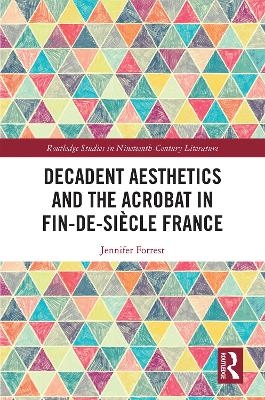
Decadent Aesthetics and the Acrobat in French Fin de siècle
Seiten
2019
Routledge (Verlag)
978-0-367-35814-3 (ISBN)
Routledge (Verlag)
978-0-367-35814-3 (ISBN)
Decadent Aesthetics and the Acrobat in the French Fin de siècle explores the myth of the sad clown as an allegory for the unappreciated artist, examining the circus posters of Jules Chéret, Thomas Couture’s Pierrot and Harlequin paintings, and Honoré Daumier’s saltimbanque paintings.
In his discussion of clowns in nineteenth-century French painting from Jean-Léon Gérôme’s 1857 La Sortie du bal masqué to Georges Rouault, art historian Francis Haskell wondered why they are so sad. The myth of the sad clown as an allegory for the unappreciated artist found echoes in the work of literary counterparts like Charles Baudelaire and his "Vieux saltimbanque" who seeks in vain a responsive public. For some, the attraction of the acrobatic clown for the creative imagination may have been his ability to embody the plight of the artist: these artistes generally led an ambulatory and uncertain existence. Other artists and writers, however, particularly the Decadents, perceived in the circus acrobat – including the acrobatic clown – a conceptual and performative tool for liberating their points of view from the prison-house of aesthetic convention. If authors’ protagonists were themselves sometimes failures, their aesthetic innovations often produced exhilarating artistic triumphs. Among the works examined in this study are the circus posters of Jules Chéret, Thomas Couture’s Pierrot and Harlequin paintings, Honoré Daumier’s saltimbanque paintings, Edgar Degas’s Miss Lala au Cirque Fernando, Édouard Manet’s Un bar au Folies-Bergère, the pantomimes of the Hanlon-Lees troupe, and novels, short stories, and poems by Théodore de Banville, Edmond de Goncourt, J. K. Huysmans, Gustave Kahn, Jules Laforgue, Catulle Mendès, Octave Mirbeau, Jean Richepin, Edouard Rod, and Marcel Schwob.
In his discussion of clowns in nineteenth-century French painting from Jean-Léon Gérôme’s 1857 La Sortie du bal masqué to Georges Rouault, art historian Francis Haskell wondered why they are so sad. The myth of the sad clown as an allegory for the unappreciated artist found echoes in the work of literary counterparts like Charles Baudelaire and his "Vieux saltimbanque" who seeks in vain a responsive public. For some, the attraction of the acrobatic clown for the creative imagination may have been his ability to embody the plight of the artist: these artistes generally led an ambulatory and uncertain existence. Other artists and writers, however, particularly the Decadents, perceived in the circus acrobat – including the acrobatic clown – a conceptual and performative tool for liberating their points of view from the prison-house of aesthetic convention. If authors’ protagonists were themselves sometimes failures, their aesthetic innovations often produced exhilarating artistic triumphs. Among the works examined in this study are the circus posters of Jules Chéret, Thomas Couture’s Pierrot and Harlequin paintings, Honoré Daumier’s saltimbanque paintings, Edgar Degas’s Miss Lala au Cirque Fernando, Édouard Manet’s Un bar au Folies-Bergère, the pantomimes of the Hanlon-Lees troupe, and novels, short stories, and poems by Théodore de Banville, Edmond de Goncourt, J. K. Huysmans, Gustave Kahn, Jules Laforgue, Catulle Mendès, Octave Mirbeau, Jean Richepin, Edouard Rod, and Marcel Schwob.
Jennifer Forrest is Professor of French at Texas State University. She is the editor of The Legend Returns and Dies Harder Another Day: Essays on Film Series (McFarland, 2008) and co-editor of Dead Ringers: The Remake in Theory and Practice (SUNY, 2002).
Introduction
Chapter One: 1857, Part I: Plays with Sad Clowns
Chapter Two: 1857, Part II: Making Clown Faces
Chapter Three: 1879, Part I: Suspending Identity with the Hanlon-Lees
Chapter Four: 1879, Part II: Time and Space and the Hanlon-Lees Effect
Chapter Five: The Paradox of the Lady Acrobat
Chapter Six: The Poetics of Pantomime and Circus, Part I: Jules Laforgue
Chapter Seven: The Poetics of Pantomime and Circus, Part II: Octave Mirbeau
Epilogue
| Erscheinungsdatum | 18.09.2019 |
|---|---|
| Reihe/Serie | Routledge Studies in Nineteenth Century Literature |
| Verlagsort | London |
| Sprache | englisch |
| Maße | 152 x 229 mm |
| Gewicht | 449 g |
| Themenwelt | Kunst / Musik / Theater ► Kunstgeschichte / Kunststile |
| Geschichte ► Allgemeine Geschichte ► Neuzeit (bis 1918) | |
| Geisteswissenschaften ► Sprach- / Literaturwissenschaft ► Anglistik / Amerikanistik | |
| Geisteswissenschaften ► Sprach- / Literaturwissenschaft ► Literaturgeschichte | |
| Geisteswissenschaften ► Sprach- / Literaturwissenschaft ► Literaturwissenschaft | |
| ISBN-10 | 0-367-35814-X / 036735814X |
| ISBN-13 | 978-0-367-35814-3 / 9780367358143 |
| Zustand | Neuware |
| Informationen gemäß Produktsicherheitsverordnung (GPSR) | |
| Haben Sie eine Frage zum Produkt? |
Mehr entdecken
aus dem Bereich
aus dem Bereich
Giordano Bruno - ein ketzerisches Leben
Buch | Hardcover (2024)
C.H.Beck (Verlag)
CHF 41,85
das dramatische 16. Jahrhundert
Buch | Hardcover (2024)
Rowohlt Berlin (Verlag)
CHF 47,60
die Fahrt der Bounty und die globale Wirtschaft im 18. Jahrhundert
Buch | Hardcover (2024)
Klett-Cotta (Verlag)
CHF 34,95


